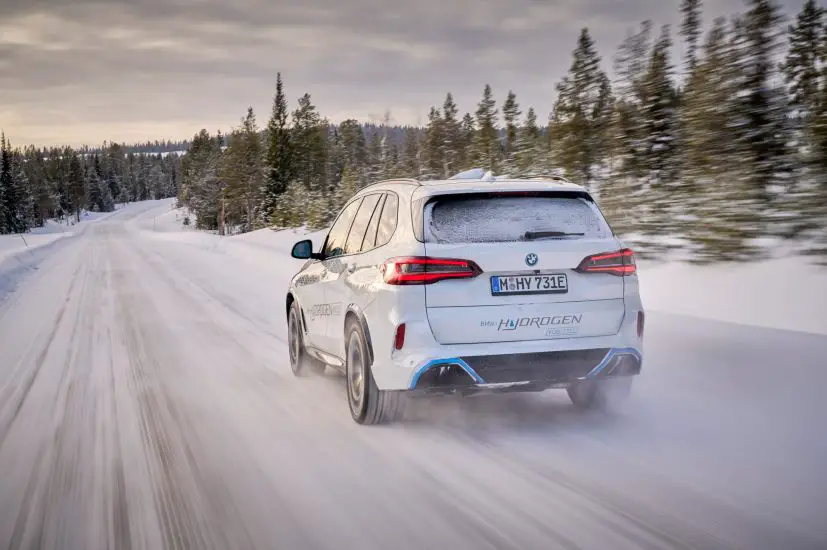
Hydrogen Cars in Winter: Will Exhaust Cause Roadway Ice?
June 1, 2024There are a number of questions many people have about using H2 in fuel cells in the cold
If hydrogen fuel is ever to become a mainstream strategy for powering vehicles for transport and transportation, then it needs to be able to withstand the types of temperatures to which vehicles will be exposed.
In many parts of the world, winters drop well below freezing
In a fuel cell, hydrogen fuel is combined with oxygen in order to produce electricity but not carbon emissions. Projects are underway to study H2 in powering everything from passenger cars and transport trucks to airplanes, container ships, trains, buses, and heavy-duty machinery. As a result, the companies, organizations and teams working on those projects need to be confident that the outcome of their work will be usable year-round.

According to Ballard’s “Fuel Cell Electric Buses: Cold Weather Operation” technical note publication, according to that company’s research, fuel cells will produce electricity by combining the oxygen and H2 without emissions at any temperature. That said, there is a difference between producing the electricity and doing so without losing performance. That same document shows that performance doesn’t degrade within the range of -30ºC (-22ºF) and 45ºC (113ºF).
Of course, performance isn’t the only factor for hydrogen fuel in winter
Among the other issues that have been voiced with respect to using H2 in fuel cells during the winter have to do with the exhaust that is produced. It’s not carbon dioxide or other greenhouse gases but is instead water. While water is something that occurs all the time in nature and isn’t typically considered concerning as an emission, some have wondered about what happens when all those vehicles produce emissions that freeze.
For instance, will ice buildup occur in a cold water vapor exhaust system or will it lead to sheet of ice forming on roadways?
Experts aren’t concerned
Those with experience with hydrogen fuel cells aren’t concerned about this issue, and there are many reasons for this. The first is that they know that conventional gasoline-powered internal combustion engines already produce a certain amount of water vapor in their emissions, and this is not a problem in those systems.
The next is that those familiar with fuel cells understand the volume of water vapor that is being produced by the systems. Unless the exhaust pipe for the water vapor were to be pointed directly down at the road and positioned close to the road surface – a design that is neither practical nor under consideration by any known vehicle manufacturer – then it won’t end up on the pavement in any meaningful way. It is, after all, warm as it leaves the exhaust and disperses in the air in the same way as water vapor from human exhalation.



 With over 15 years of reporting hydrogen news, we are your premier source for the latest updates and insights in hydrogen and renewable energy.
With over 15 years of reporting hydrogen news, we are your premier source for the latest updates and insights in hydrogen and renewable energy.
Some people like to create problems where there aren’t any.
Some people have not lived in a northern climate and do not understand how real of an issue this is in cold weather. The article is completely wrong when it implies that gasoline powered vehicles don’t cause road ice. This is a very common occurrence on frozen roadways. Vehicle exhaust causes much of the “black ice” drivers often talk about. Water is constantly dripping from tail pipes of all vehicles onto the roadway surface and instantly forms a thin layer of ice. Happens every day in the north country during cold spells, usually below 10F and very prominent below -10F.
If water exhaust does prove to be a BIG problem, couldn’t the exhausts of busses and heavy transport be pointed vertically like agricultural tractors?
Think this article is overly optimistic. I’ve lived in the cold Canadian prairies and even the NWT for 20 years water vapour coming out tailpipes will drip on the road surface and when really cold, -30 to -40C will create an ice fog. In Inuvik, NWT, you could not even see across the street when people let their cars idle during lunch. I suspect the volume of H2O in H2 vehicles will be magnitudes worse. It’s doesn’t take much to leave a sheen of ice on the road surface in cold temps.
It’s actually not that big of a difference in water vapor exhaust between hydrogen and gasoline.
I’m Swedish (European) so excuse me for using metric numbers.
1 kg petrol produces 1,42 kg of water.
1 kg hydrogen produses 9 kg of water.
But….by energy content, 1 kg hydrogen contains about 3 times more energy than gasoline so you will only have to use 1/3 kg hydrogen to produce the same power as gasoline.
Therefore the hydrogen only produces 3 kg water.
Next thing is the efficiency of the fuel cell and the engine.
A fuel cell has at least 60% efficiency, meaning 60% of the chemical energy in the hydrogen is converted to useful power.
A petrol engine rarely has better than 30% efficiency.
So in total a fuel cell car will emit 5 kg of water when producing exactly the same power as a petrol engine that produces 10 kg of water.
And to top it off, fuel cell cars dont idle the fuel cell – they use their on board batteries (unless the battery is discharged) to keep the car interior warm and cosy (like a Tesla).
Sorry, I did a miscalculation in my previous comment.
Both the petrol car and the fuel cell car would produce around 5 kg of water when producing exactly the same power (given 60% efficiency for the fuel cell and 30% for the petrol engine).
But…. The exhausts of the petrol car is hotter so more of the water will evaporate and not end up on the road.
So the Petro cars are already a problem with icing at intersection… Fuel Cells produces 2x the amount of water on the roads and what keeps it from Freezing in the parked car when it’s well below freezing?
My water bottle freezes inside my car’s cabin… How well does this generate power when a solid?